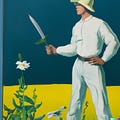Struggle over comfort
It’s about the journey, not the destination—The catastrophe of success—Have a bias for action—Avoid fake work
Hi all,
I always loved summer reading. China Boy, Ender’s Game, and Watership Down are a few classics I couldn’t put down as a pasty adolescent. Did I enjoy writing smeary, half-baked essays on them at school on a humid September afternoon? Not really. Fortunately, as an adult, I just get to do the reading part.
Here’s my summer reading list this year:
Woodsy and reflective:
The Essential Writings of Ralph Waldo Emerson, Ralph Waldo Emerson
The Pilgrim at Tinker Creek, Annie Dillard
The Prophet, Khalil Gibran
Light and breezy:
Battle Hymn of the Tiger Mother, Amy Chua
A Supposedly Fun Thing I’ll Never Do Again, David Faster Wallace
The Defining Decade, Meg Jay
Business as usual:
The Myth of Artificial Intelligence, Erik Larson
The Status Game, Will Storr
The Management Myth, Matthew Stewart
Have a good long holiday weekend!
—Brendan
#1 It’s about the journey, not the destination
“You build your business, sell it, and get a nice pay-day. Then what? Move to an island and sip piña coladas all day? Will that really satisfy you? Will money alone truly make you happy? Are you sure you’ll like that more than running a business you actually enjoy and believe in?”
—Jason Fried and David Heinemeier Hansson, Rework
In April 2000, Gary Erickson was about to sign a deal with Quaker Oats to sell his business, CLIF Bar & Company, for $120 million.
The contract was ready, the lawyers were all there. All Gary had to do was sign the paper, and he never had to worry about money again.
Gary took a lap around the building.
And another lap.
He could not bring himself to sign the paper. CLIF bars, named after his father and formulated in his mother’s kitchen, were his calling in life, his project. To him, the journey was still more important than the destination, and he knew it was far from over.
#2 The catastrophe of success
[T]he heart of man, his body and his brain, are forged in a white-hot furnace for the purpose of conflict (the struggle of creation) and that with the conflict removed, the man is a sword cutting daisies.”
—Tennessee Williams, “The Catastrophe of Success”
Tennessee Williams began seriously writing late into the night to escape the monotony of his 9-to-5 job at a shoe factory. He struggled in obscurity for a decade before achieving national fame with his plays The Glass Managerie and A Streetcar Named Desire.
Williams found success disorienting and depressing. He moved into an expensive Manhattan hotel and began throwing lavish parties and ordering nightly room service. With nothing to struggle for, he was more miserable than ever before. There was no bright future to hope for, only a parade of sirloins steaks and cigarettes.
“Security is a kind of death,” he later wrote, “and it can come to you in a storm of royalty checks beside a kidney-shaped pool in Beverly Hills or anywhere at all that is removed from the conditions that made you an artist, if that’s what you are or were intended to be.”
He learned that struggle is a gift. It’s the resistance we overcome to self-actualize, the enemy we conquer to feel heroic.
Without it, we are stagnant and sloth, just a “sword cutting daisies.”
#3 Have a bias for action
“Make mistakes of ambition and not mistakes of sloth.”
—Niccolò Machiavelli
There are two ways to fail. You can fail because you attempt something a bit beyond your level of experience or competence. These are mistakes of ambition. Or you can fail because you decide not to try at all. These are mistakes of sloth.
Mistakes of ambition are generally better because you learn far more from the experience. As Robert Greene writes in The Daily Laws, “they toughen your spirit and show you with absolute clarity how things must be done. In fact, it is a curse to have everything go right on your first attempt. You will fail to question the element of luck, making you think that you have the golden touch.”
If humans have evolved to find meaning in struggle, we generally find acting on our ambitions more fulfilling than sitting around thinking about them.
#4 Avoid fake work
"The most dangerous way to lose time is not to spend it having fun, but to spend it doing fake work."
—Paul Graham, “How to Lose Time and Money”
One way you can tell that you’re doing fake work is that you often do it as an excuse to avoid doing what’s more difficult (and more important).
“Write that tough email? Too bad I need to polish the kitchen floor.”
Always stay on top of the toughest, hairiest thing on your to-do list. It is the big rock—you’re main pursuit—and you can fill in the easier pebbles around it.
Thanks for reading! I love when these thoughts lead to conversations with readers. Did you find anything interesting or surprising? Reply to me and let me know.







